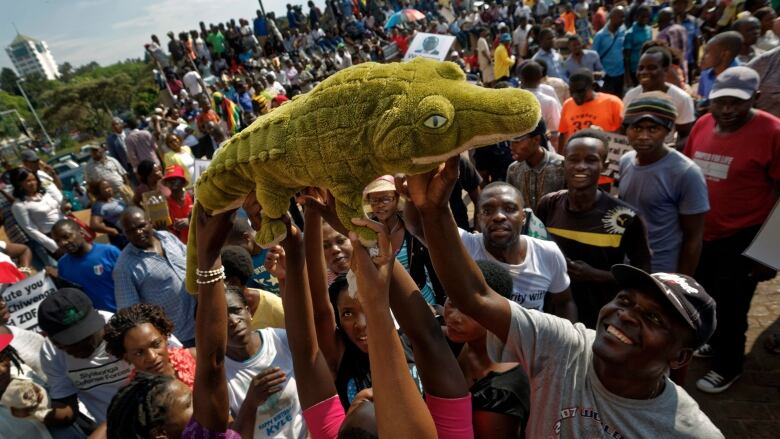Beware of Zimbabwe's new leader, Emmerson 'Crocodile' Mnangagwa, says student

On Friday, Emmerson Mnangagwa will be sworn in as president of Zimbabwe.
He will be the first new president the country has had since 1980, when Robert Mugabe assumed power of a newly independent Zimbabwe.
The streets have been filled with hopeful celebrations since Mugabe's resignation on Tuesday. But not everyone is optimistic about his successor.
-
AS IT HAPPENS: Exiled reporter may finally be able to go home
As It Happens host Carol Off spoke with Leon Mighti about an op-ed the Johannesburg-based law student wrote for the Daily Maverick titled "Beware 'Crocodile' Mnangagwa: Zanu-PF is not renewing, it is a snake shedding its old skin."
Here is part of their conversation.
Why should people be wary of the next president of Zimbabwe, Emmerson Mnangagwa?
Basically, because he was the second hand man who assisted Robert Mugabe throughout his 37 years of rule, so it's unlikely that he will change tact just now.
His nickname is "The Crocodile." Why is that?
Can you tell us a bit more about that notorious massacre? What happened there and who was responsible?
Robert Mugabe was responsible, but he instructed several generals who supported him to carry out a genocidal mission in Matabeleland, where a tribe, which was opposed to his rule, lived.

There are many instances of human rights abuses that Mr. Mugabe is accused of. Can you run us through some of the more egregious crimes that people accuse Mr. Mugabe of where Mr. Mnangagwa was involved?
The first one is the genocidal massacre. It's referred to as the Gukurahundi, from a Shona word which means "cleansing."
Secondary to that was the abduction and disappearance of many political activists who opposed Robert Mugabe throughout the 37 years of his rule.
Mugabe has also been criticized for corruption. There was supposed to be a land reform program in Zimbabwe and Mugabe basically took most of the land for himself and his military generals and the political elite.
So those are the criticisms that have been leveled against Mugabe over the years, along with Emmerson Mnangagwa.
One of the other areas that Mr. Mugabe has been accused of is vote rigging and election fixing. I understand that Mr. Mnangagwa was key to that?

You are in South Africa right now, and the Southern African community has watched this very closely, and was going to oppose any appearance that Zimbabwe was going to be taken over by a coup ... but what exactly has happened here? Despite the sort of support there seems to be in Southern Africa and in the region for this change of government in Zimbabwe, what has actually occurred?
The army intervened to make sure that their preferred candidate rose to the leadership of the party.
When they noticed that there was a lot of opposition coming from the West, from the Southern African Development Community, and the African Union, it is at that point that they started trying to get the people involved to try to make it look like a people's revolution.

But people are genuinely in the streets, are they not? I mean, what we've seen in the past days — this jubilation, this street party — it appears genuine. People are cheering on the end of Mr. Mugabe and appear to be cheering on the arrival of Mr. Mnangagwa. So how do you explain that?
I think there is a lot of catharsis happening right now. People have been so brutalized by Mugabe that they would have accepted any savior, including a tainted savior.
A lot of people have said that even though they appreciate and understand that a lot of discussions have to happen around what kind of a Zimbabwe has to be created, they are just happy to have Mugabe fall.
That's also why some of the people are embracing Mnangagwa and the army, because they view them as the necessary evil that saved them.
Right now, a lot of people are caught up in the euphoria of the moment. They're willing to take it by any means necessary, even if it includes the army giving them that gift as a poison chalice.
This interview transcript has been edited for length and clarity. For more on this story, listen to our full interview with Leon Mighti.